Analyzing Issue Framing in International Environmental Agreements
VerifiedAdded on 2023/03/30
|7
|1582
|131
Essay
AI Summary
This essay provides an in-depth analysis of issue framing within the context of international environmental agreements, highlighting how different perspectives and power dynamics shape the understanding and implementation of these agreements. It addresses existing barriers to framing international environmental issues, such as political considerations, north-south conflicts, and scientific uncertainties. The essay uses the 2015 United Nations Climate Change Conference as a case study, examining how climate change is framed through security, human rights, and environmental lenses. It concludes that a comprehensive understanding of environmental conditions and future events is crucial for effective handling of global environmental issues at local, regional, and international levels. Desklib is a platform where students can find more resources on similar topics.
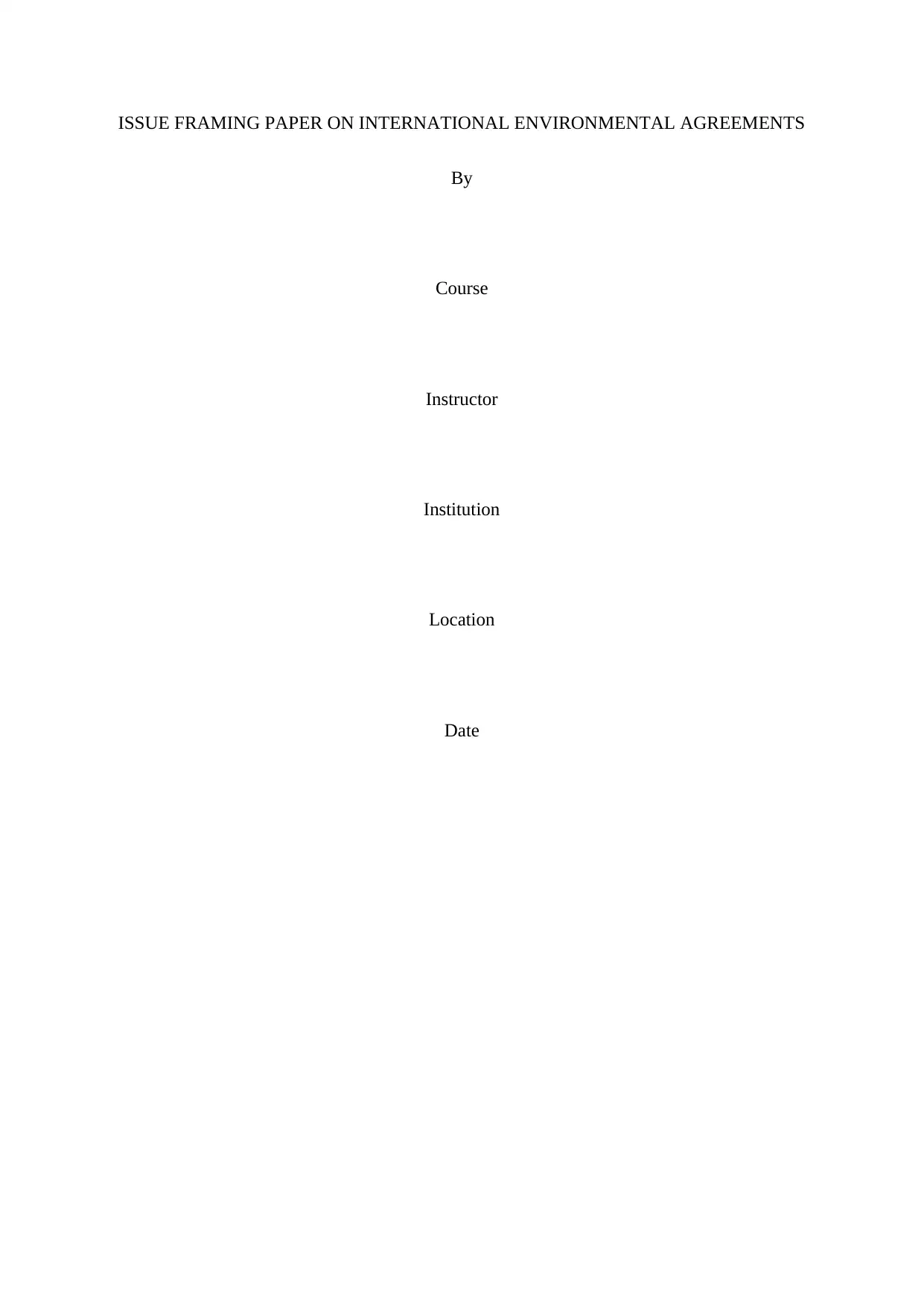
ISSUE FRAMING PAPER ON INTERNATIONAL ENVIRONMENTAL AGREEMENTS
By
Course
Instructor
Institution
Location
Date
By
Course
Instructor
Institution
Location
Date
Paraphrase This Document
Need a fresh take? Get an instant paraphrase of this document with our AI Paraphraser
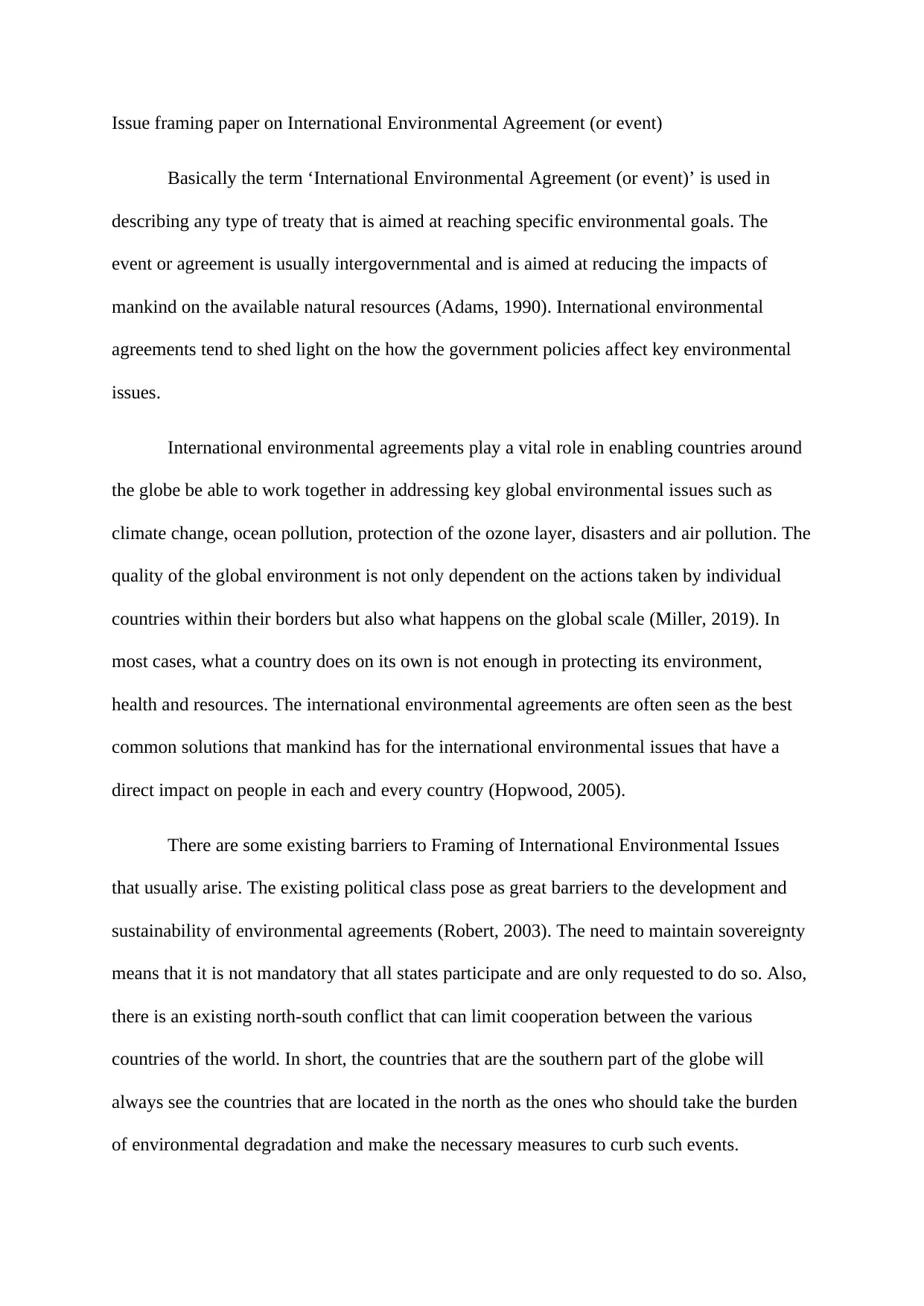
Issue framing paper on International Environmental Agreement (or event)
Basically the term ‘International Environmental Agreement (or event)’ is used in
describing any type of treaty that is aimed at reaching specific environmental goals. The
event or agreement is usually intergovernmental and is aimed at reducing the impacts of
mankind on the available natural resources (Adams, 1990). International environmental
agreements tend to shed light on the how the government policies affect key environmental
issues.
International environmental agreements play a vital role in enabling countries around
the globe be able to work together in addressing key global environmental issues such as
climate change, ocean pollution, protection of the ozone layer, disasters and air pollution. The
quality of the global environment is not only dependent on the actions taken by individual
countries within their borders but also what happens on the global scale (Miller, 2019). In
most cases, what a country does on its own is not enough in protecting its environment,
health and resources. The international environmental agreements are often seen as the best
common solutions that mankind has for the international environmental issues that have a
direct impact on people in each and every country (Hopwood, 2005).
There are some existing barriers to Framing of International Environmental Issues
that usually arise. The existing political class pose as great barriers to the development and
sustainability of environmental agreements (Robert, 2003). The need to maintain sovereignty
means that it is not mandatory that all states participate and are only requested to do so. Also,
there is an existing north-south conflict that can limit cooperation between the various
countries of the world. In short, the countries that are the southern part of the globe will
always see the countries that are located in the north as the ones who should take the burden
of environmental degradation and make the necessary measures to curb such events.
Basically the term ‘International Environmental Agreement (or event)’ is used in
describing any type of treaty that is aimed at reaching specific environmental goals. The
event or agreement is usually intergovernmental and is aimed at reducing the impacts of
mankind on the available natural resources (Adams, 1990). International environmental
agreements tend to shed light on the how the government policies affect key environmental
issues.
International environmental agreements play a vital role in enabling countries around
the globe be able to work together in addressing key global environmental issues such as
climate change, ocean pollution, protection of the ozone layer, disasters and air pollution. The
quality of the global environment is not only dependent on the actions taken by individual
countries within their borders but also what happens on the global scale (Miller, 2019). In
most cases, what a country does on its own is not enough in protecting its environment,
health and resources. The international environmental agreements are often seen as the best
common solutions that mankind has for the international environmental issues that have a
direct impact on people in each and every country (Hopwood, 2005).
There are some existing barriers to Framing of International Environmental Issues
that usually arise. The existing political class pose as great barriers to the development and
sustainability of environmental agreements (Robert, 2003). The need to maintain sovereignty
means that it is not mandatory that all states participate and are only requested to do so. Also,
there is an existing north-south conflict that can limit cooperation between the various
countries of the world. In short, the countries that are the southern part of the globe will
always see the countries that are located in the north as the ones who should take the burden
of environmental degradation and make the necessary measures to curb such events.
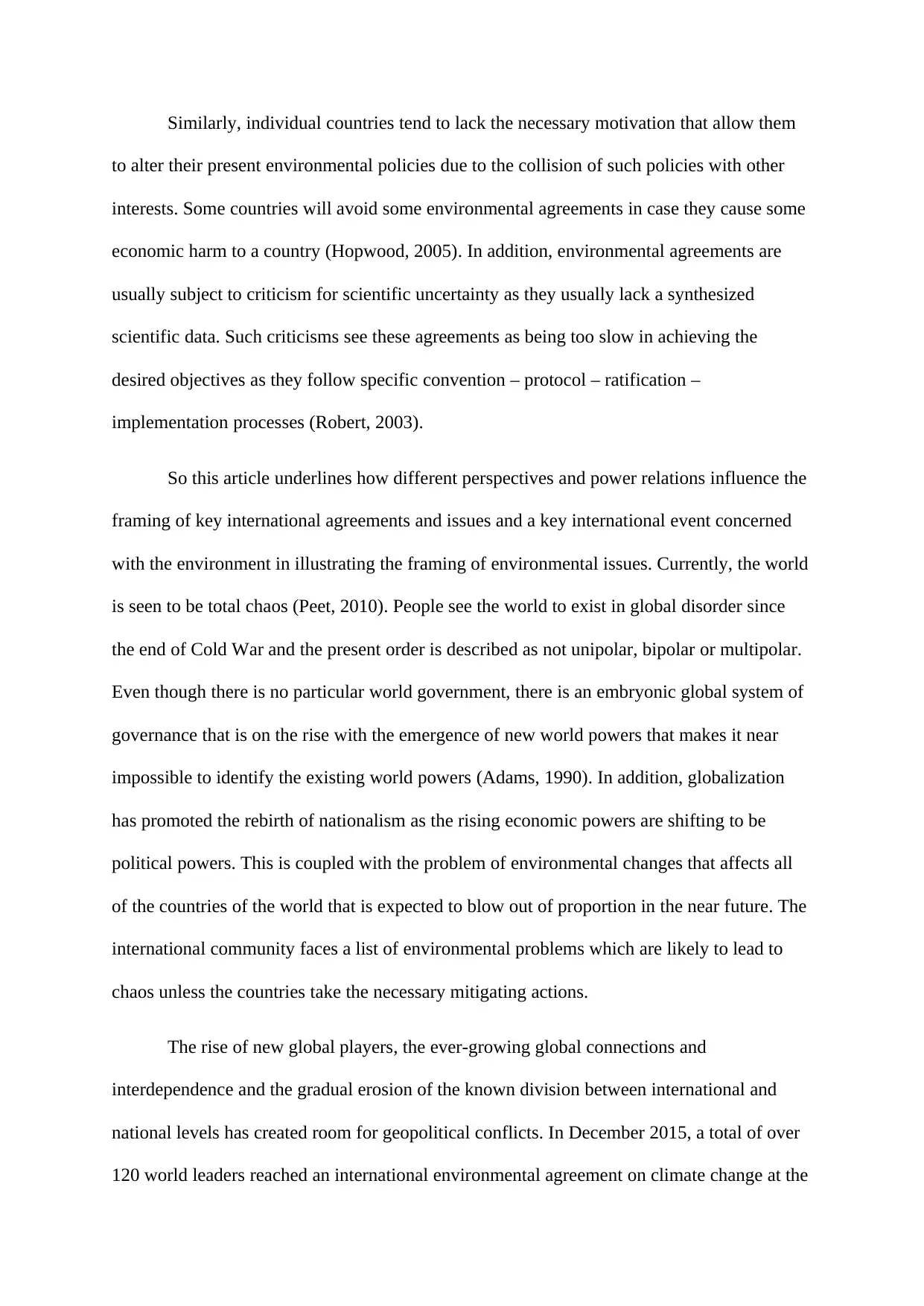
Similarly, individual countries tend to lack the necessary motivation that allow them
to alter their present environmental policies due to the collision of such policies with other
interests. Some countries will avoid some environmental agreements in case they cause some
economic harm to a country (Hopwood, 2005). In addition, environmental agreements are
usually subject to criticism for scientific uncertainty as they usually lack a synthesized
scientific data. Such criticisms see these agreements as being too slow in achieving the
desired objectives as they follow specific convention – protocol – ratification –
implementation processes (Robert, 2003).
So this article underlines how different perspectives and power relations influence the
framing of key international agreements and issues and a key international event concerned
with the environment in illustrating the framing of environmental issues. Currently, the world
is seen to be total chaos (Peet, 2010). People see the world to exist in global disorder since
the end of Cold War and the present order is described as not unipolar, bipolar or multipolar.
Even though there is no particular world government, there is an embryonic global system of
governance that is on the rise with the emergence of new world powers that makes it near
impossible to identify the existing world powers (Adams, 1990). In addition, globalization
has promoted the rebirth of nationalism as the rising economic powers are shifting to be
political powers. This is coupled with the problem of environmental changes that affects all
of the countries of the world that is expected to blow out of proportion in the near future. The
international community faces a list of environmental problems which are likely to lead to
chaos unless the countries take the necessary mitigating actions.
The rise of new global players, the ever-growing global connections and
interdependence and the gradual erosion of the known division between international and
national levels has created room for geopolitical conflicts. In December 2015, a total of over
120 world leaders reached an international environmental agreement on climate change at the
to alter their present environmental policies due to the collision of such policies with other
interests. Some countries will avoid some environmental agreements in case they cause some
economic harm to a country (Hopwood, 2005). In addition, environmental agreements are
usually subject to criticism for scientific uncertainty as they usually lack a synthesized
scientific data. Such criticisms see these agreements as being too slow in achieving the
desired objectives as they follow specific convention – protocol – ratification –
implementation processes (Robert, 2003).
So this article underlines how different perspectives and power relations influence the
framing of key international agreements and issues and a key international event concerned
with the environment in illustrating the framing of environmental issues. Currently, the world
is seen to be total chaos (Peet, 2010). People see the world to exist in global disorder since
the end of Cold War and the present order is described as not unipolar, bipolar or multipolar.
Even though there is no particular world government, there is an embryonic global system of
governance that is on the rise with the emergence of new world powers that makes it near
impossible to identify the existing world powers (Adams, 1990). In addition, globalization
has promoted the rebirth of nationalism as the rising economic powers are shifting to be
political powers. This is coupled with the problem of environmental changes that affects all
of the countries of the world that is expected to blow out of proportion in the near future. The
international community faces a list of environmental problems which are likely to lead to
chaos unless the countries take the necessary mitigating actions.
The rise of new global players, the ever-growing global connections and
interdependence and the gradual erosion of the known division between international and
national levels has created room for geopolitical conflicts. In December 2015, a total of over
120 world leaders reached an international environmental agreement on climate change at the
⊘ This is a preview!⊘
Do you want full access?
Subscribe today to unlock all pages.

Trusted by 1+ million students worldwide
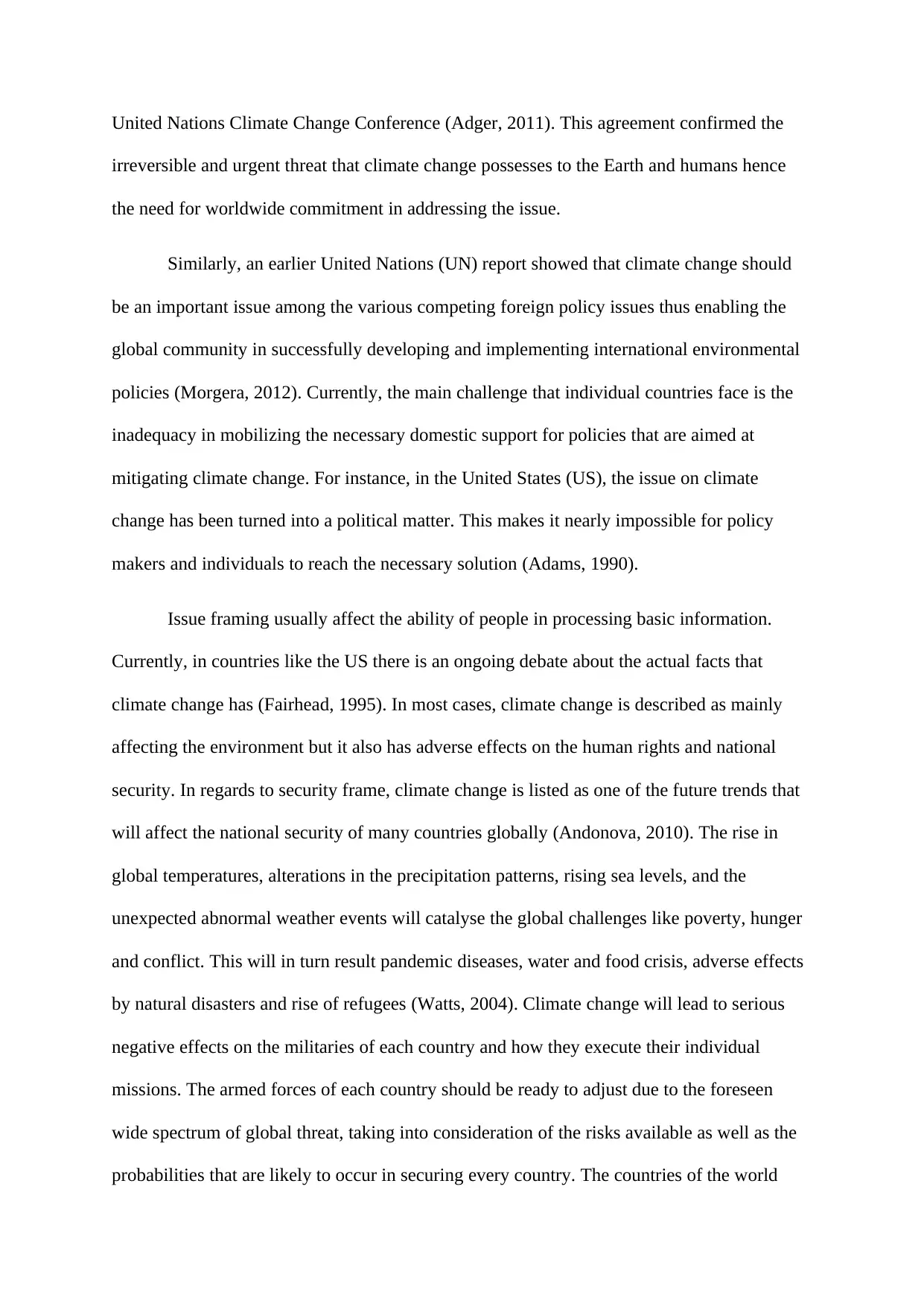
United Nations Climate Change Conference (Adger, 2011). This agreement confirmed the
irreversible and urgent threat that climate change possesses to the Earth and humans hence
the need for worldwide commitment in addressing the issue.
Similarly, an earlier United Nations (UN) report showed that climate change should
be an important issue among the various competing foreign policy issues thus enabling the
global community in successfully developing and implementing international environmental
policies (Morgera, 2012). Currently, the main challenge that individual countries face is the
inadequacy in mobilizing the necessary domestic support for policies that are aimed at
mitigating climate change. For instance, in the United States (US), the issue on climate
change has been turned into a political matter. This makes it nearly impossible for policy
makers and individuals to reach the necessary solution (Adams, 1990).
Issue framing usually affect the ability of people in processing basic information.
Currently, in countries like the US there is an ongoing debate about the actual facts that
climate change has (Fairhead, 1995). In most cases, climate change is described as mainly
affecting the environment but it also has adverse effects on the human rights and national
security. In regards to security frame, climate change is listed as one of the future trends that
will affect the national security of many countries globally (Andonova, 2010). The rise in
global temperatures, alterations in the precipitation patterns, rising sea levels, and the
unexpected abnormal weather events will catalyse the global challenges like poverty, hunger
and conflict. This will in turn result pandemic diseases, water and food crisis, adverse effects
by natural disasters and rise of refugees (Watts, 2004). Climate change will lead to serious
negative effects on the militaries of each country and how they execute their individual
missions. The armed forces of each country should be ready to adjust due to the foreseen
wide spectrum of global threat, taking into consideration of the risks available as well as the
probabilities that are likely to occur in securing every country. The countries of the world
irreversible and urgent threat that climate change possesses to the Earth and humans hence
the need for worldwide commitment in addressing the issue.
Similarly, an earlier United Nations (UN) report showed that climate change should
be an important issue among the various competing foreign policy issues thus enabling the
global community in successfully developing and implementing international environmental
policies (Morgera, 2012). Currently, the main challenge that individual countries face is the
inadequacy in mobilizing the necessary domestic support for policies that are aimed at
mitigating climate change. For instance, in the United States (US), the issue on climate
change has been turned into a political matter. This makes it nearly impossible for policy
makers and individuals to reach the necessary solution (Adams, 1990).
Issue framing usually affect the ability of people in processing basic information.
Currently, in countries like the US there is an ongoing debate about the actual facts that
climate change has (Fairhead, 1995). In most cases, climate change is described as mainly
affecting the environment but it also has adverse effects on the human rights and national
security. In regards to security frame, climate change is listed as one of the future trends that
will affect the national security of many countries globally (Andonova, 2010). The rise in
global temperatures, alterations in the precipitation patterns, rising sea levels, and the
unexpected abnormal weather events will catalyse the global challenges like poverty, hunger
and conflict. This will in turn result pandemic diseases, water and food crisis, adverse effects
by natural disasters and rise of refugees (Watts, 2004). Climate change will lead to serious
negative effects on the militaries of each country and how they execute their individual
missions. The armed forces of each country should be ready to adjust due to the foreseen
wide spectrum of global threat, taking into consideration of the risks available as well as the
probabilities that are likely to occur in securing every country. The countries of the world
Paraphrase This Document
Need a fresh take? Get an instant paraphrase of this document with our AI Paraphraser
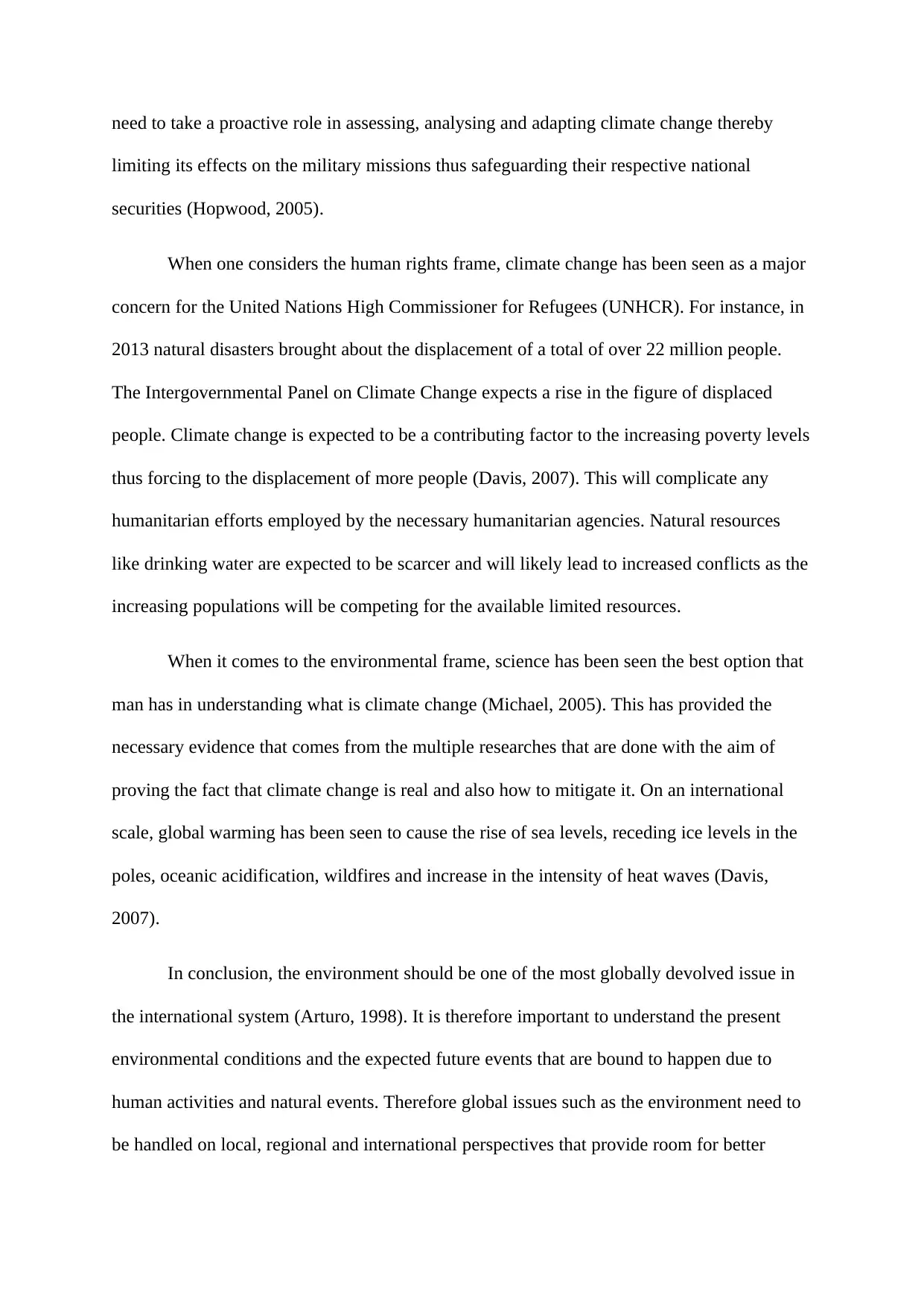
need to take a proactive role in assessing, analysing and adapting climate change thereby
limiting its effects on the military missions thus safeguarding their respective national
securities (Hopwood, 2005).
When one considers the human rights frame, climate change has been seen as a major
concern for the United Nations High Commissioner for Refugees (UNHCR). For instance, in
2013 natural disasters brought about the displacement of a total of over 22 million people.
The Intergovernmental Panel on Climate Change expects a rise in the figure of displaced
people. Climate change is expected to be a contributing factor to the increasing poverty levels
thus forcing to the displacement of more people (Davis, 2007). This will complicate any
humanitarian efforts employed by the necessary humanitarian agencies. Natural resources
like drinking water are expected to be scarcer and will likely lead to increased conflicts as the
increasing populations will be competing for the available limited resources.
When it comes to the environmental frame, science has been seen the best option that
man has in understanding what is climate change (Michael, 2005). This has provided the
necessary evidence that comes from the multiple researches that are done with the aim of
proving the fact that climate change is real and also how to mitigate it. On an international
scale, global warming has been seen to cause the rise of sea levels, receding ice levels in the
poles, oceanic acidification, wildfires and increase in the intensity of heat waves (Davis,
2007).
In conclusion, the environment should be one of the most globally devolved issue in
the international system (Arturo, 1998). It is therefore important to understand the present
environmental conditions and the expected future events that are bound to happen due to
human activities and natural events. Therefore global issues such as the environment need to
be handled on local, regional and international perspectives that provide room for better
limiting its effects on the military missions thus safeguarding their respective national
securities (Hopwood, 2005).
When one considers the human rights frame, climate change has been seen as a major
concern for the United Nations High Commissioner for Refugees (UNHCR). For instance, in
2013 natural disasters brought about the displacement of a total of over 22 million people.
The Intergovernmental Panel on Climate Change expects a rise in the figure of displaced
people. Climate change is expected to be a contributing factor to the increasing poverty levels
thus forcing to the displacement of more people (Davis, 2007). This will complicate any
humanitarian efforts employed by the necessary humanitarian agencies. Natural resources
like drinking water are expected to be scarcer and will likely lead to increased conflicts as the
increasing populations will be competing for the available limited resources.
When it comes to the environmental frame, science has been seen the best option that
man has in understanding what is climate change (Michael, 2005). This has provided the
necessary evidence that comes from the multiple researches that are done with the aim of
proving the fact that climate change is real and also how to mitigate it. On an international
scale, global warming has been seen to cause the rise of sea levels, receding ice levels in the
poles, oceanic acidification, wildfires and increase in the intensity of heat waves (Davis,
2007).
In conclusion, the environment should be one of the most globally devolved issue in
the international system (Arturo, 1998). It is therefore important to understand the present
environmental conditions and the expected future events that are bound to happen due to
human activities and natural events. Therefore global issues such as the environment need to
be handled on local, regional and international perspectives that provide room for better

understanding of international environmental events. With a world full of geopolitical
changes, it is vital to underline the existing global risks and foster cooperation when it comes
to matters environment.
changes, it is vital to underline the existing global risks and foster cooperation when it comes
to matters environment.
⊘ This is a preview!⊘
Do you want full access?
Subscribe today to unlock all pages.

Trusted by 1+ million students worldwide
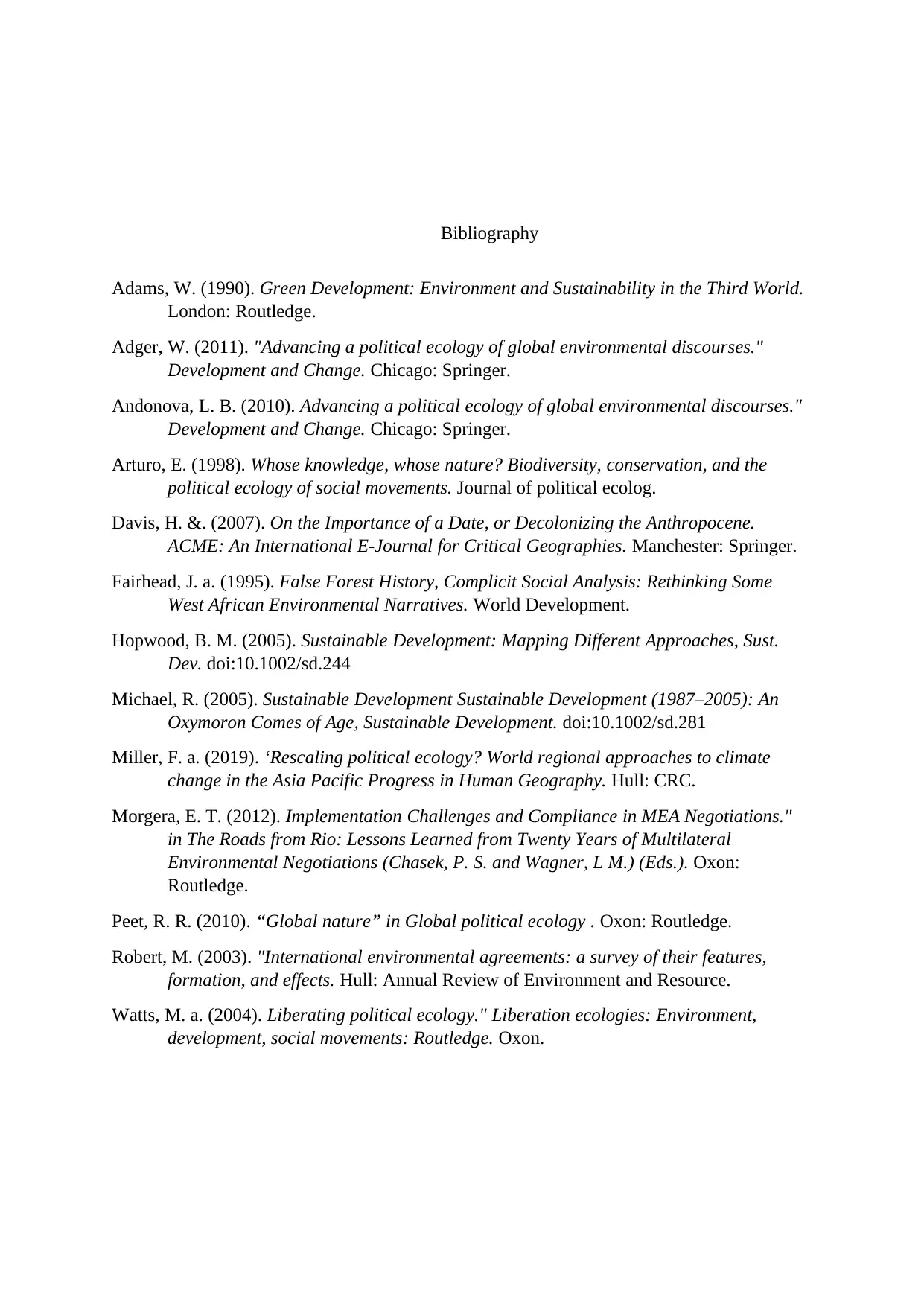
Bibliography
Adams, W. (1990). Green Development: Environment and Sustainability in the Third World.
London: Routledge.
Adger, W. (2011). "Advancing a political ecology of global environmental discourses."
Development and Change. Chicago: Springer.
Andonova, L. B. (2010). Advancing a political ecology of global environmental discourses."
Development and Change. Chicago: Springer.
Arturo, E. (1998). Whose knowledge, whose nature? Biodiversity, conservation, and the
political ecology of social movements. Journal of political ecolog.
Davis, H. &. (2007). On the Importance of a Date, or Decolonizing the Anthropocene.
ACME: An International E-Journal for Critical Geographies. Manchester: Springer.
Fairhead, J. a. (1995). False Forest History, Complicit Social Analysis: Rethinking Some
West African Environmental Narratives. World Development.
Hopwood, B. M. (2005). Sustainable Development: Mapping Different Approaches, Sust.
Dev. doi:10.1002/sd.244
Michael, R. (2005). Sustainable Development Sustainable Development (1987–2005): An
Oxymoron Comes of Age, Sustainable Development. doi:10.1002/sd.281
Miller, F. a. (2019). ‘Rescaling political ecology? World regional approaches to climate
change in the Asia Pacific Progress in Human Geography. Hull: CRC.
Morgera, E. T. (2012). Implementation Challenges and Compliance in MEA Negotiations."
in The Roads from Rio: Lessons Learned from Twenty Years of Multilateral
Environmental Negotiations (Chasek, P. S. and Wagner, L M.) (Eds.). Oxon:
Routledge.
Peet, R. R. (2010). “Global nature” in Global political ecology . Oxon: Routledge.
Robert, M. (2003). "International environmental agreements: a survey of their features,
formation, and effects. Hull: Annual Review of Environment and Resource.
Watts, M. a. (2004). Liberating political ecology." Liberation ecologies: Environment,
development, social movements: Routledge. Oxon.
Adams, W. (1990). Green Development: Environment and Sustainability in the Third World.
London: Routledge.
Adger, W. (2011). "Advancing a political ecology of global environmental discourses."
Development and Change. Chicago: Springer.
Andonova, L. B. (2010). Advancing a political ecology of global environmental discourses."
Development and Change. Chicago: Springer.
Arturo, E. (1998). Whose knowledge, whose nature? Biodiversity, conservation, and the
political ecology of social movements. Journal of political ecolog.
Davis, H. &. (2007). On the Importance of a Date, or Decolonizing the Anthropocene.
ACME: An International E-Journal for Critical Geographies. Manchester: Springer.
Fairhead, J. a. (1995). False Forest History, Complicit Social Analysis: Rethinking Some
West African Environmental Narratives. World Development.
Hopwood, B. M. (2005). Sustainable Development: Mapping Different Approaches, Sust.
Dev. doi:10.1002/sd.244
Michael, R. (2005). Sustainable Development Sustainable Development (1987–2005): An
Oxymoron Comes of Age, Sustainable Development. doi:10.1002/sd.281
Miller, F. a. (2019). ‘Rescaling political ecology? World regional approaches to climate
change in the Asia Pacific Progress in Human Geography. Hull: CRC.
Morgera, E. T. (2012). Implementation Challenges and Compliance in MEA Negotiations."
in The Roads from Rio: Lessons Learned from Twenty Years of Multilateral
Environmental Negotiations (Chasek, P. S. and Wagner, L M.) (Eds.). Oxon:
Routledge.
Peet, R. R. (2010). “Global nature” in Global political ecology . Oxon: Routledge.
Robert, M. (2003). "International environmental agreements: a survey of their features,
formation, and effects. Hull: Annual Review of Environment and Resource.
Watts, M. a. (2004). Liberating political ecology." Liberation ecologies: Environment,
development, social movements: Routledge. Oxon.
1 out of 7
Related Documents
Your All-in-One AI-Powered Toolkit for Academic Success.
+13062052269
info@desklib.com
Available 24*7 on WhatsApp / Email
![[object Object]](/_next/static/media/star-bottom.7253800d.svg)
Unlock your academic potential
Copyright © 2020–2026 A2Z Services. All Rights Reserved. Developed and managed by ZUCOL.





